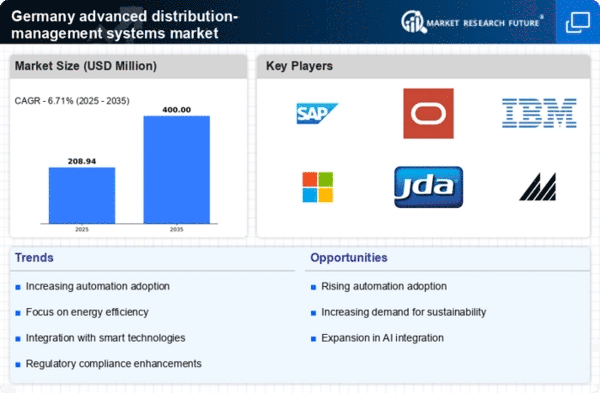Regulatory Compliance and Standards
In Germany, stringent regulatory requirements are shaping the advanced distribution-management-systems market. Companies are compelled to adopt systems that ensure compliance with local and EU regulations, particularly concerning data protection and environmental standards. The implementation of advanced distribution-management-systems not only aids in meeting these regulations but also enhances transparency and accountability within supply chains. As businesses strive to avoid penalties and maintain their reputations, the demand for compliant systems is expected to rise. This focus on regulatory adherence is likely to propel the advanced distribution-management-systems market, as organizations invest in technologies that facilitate compliance and improve operational integrity.
Focus on Cost Reduction and Efficiency
Cost reduction remains a primary objective for businesses in Germany, significantly impacting the advanced distribution-management-systems market. Companies are under constant pressure to minimize expenses while maintaining high service levels. Advanced distribution-management-systems facilitate this by optimizing logistics, reducing waste, and improving resource allocation. By implementing these systems, organizations can achieve substantial cost savings, with studies suggesting potential reductions of up to 15% in operational costs. This focus on efficiency and cost-effectiveness is likely to drive the adoption of advanced distribution-management-systems, as businesses seek to enhance their profitability in a competitive landscape.
Growth of E-commerce and Online Retail
The rapid expansion of e-commerce in Germany is significantly influencing the advanced distribution-management-systems market. As online retail continues to grow, businesses are increasingly challenged to manage complex logistics and distribution networks efficiently. Advanced distribution-management-systems provide the necessary tools to streamline operations, manage inventory effectively, and enhance customer service. Reports indicate that e-commerce sales in Germany are projected to reach €100 billion by 2025, necessitating robust distribution solutions. This growth in online retail is likely to drive investments in advanced distribution-management-systems, as companies seek to adapt to changing consumer behaviors and expectations.
Rising Demand for Real-Time Data Analytics
The advanced distribution-management-systems market in Germany is experiencing a notable surge in demand for real-time data analytics. Companies are increasingly recognizing the value of data-driven decision-making, which enhances operational efficiency and customer satisfaction. The integration of advanced analytics tools allows businesses to monitor supply chain performance in real-time, leading to improved inventory management and reduced operational costs. According to recent studies, organizations utilizing real-time analytics can achieve up to a 20% increase in efficiency. This trend is likely to continue as more companies seek to leverage data insights to optimize their distribution processes, thereby driving growth in the advanced distribution-management-systems market.
Technological Advancements in Supply Chain Management
Technological innovations are playing a crucial role in shaping the advanced distribution-management-systems market in Germany. The adoption of technologies such as artificial intelligence, machine learning, and the Internet of Things (IoT) is transforming supply chain management practices. These advancements enable companies to automate processes, enhance visibility, and improve decision-making capabilities. As organizations increasingly recognize the benefits of these technologies, investments in advanced distribution-management-systems are expected to rise. The market is likely to witness a shift towards more sophisticated systems that leverage these technologies to optimize distribution operations and drive competitive advantage.
















